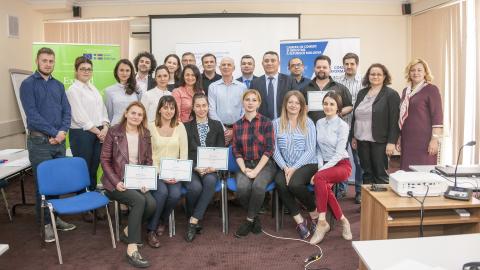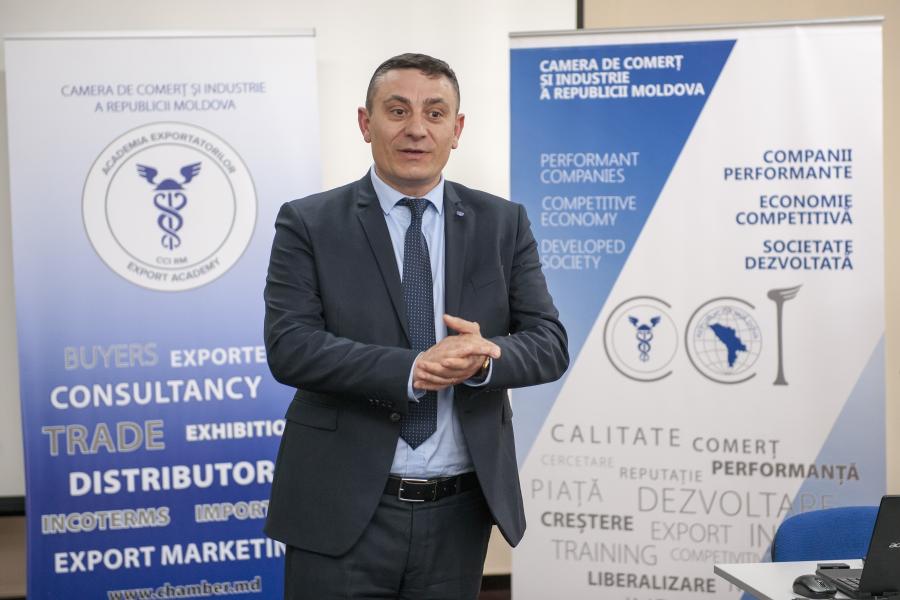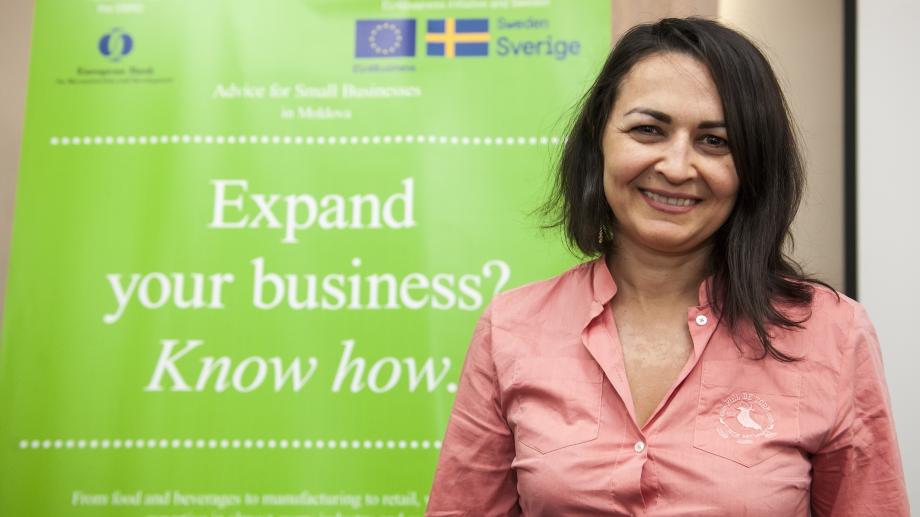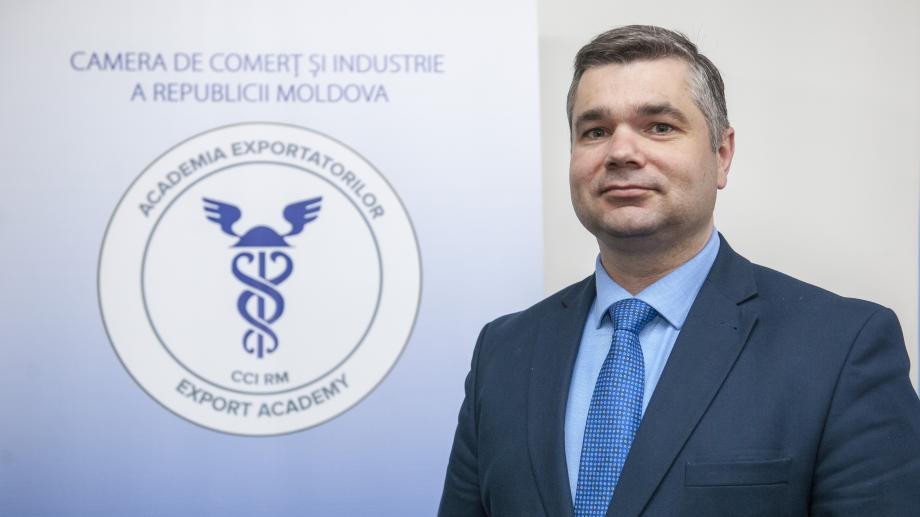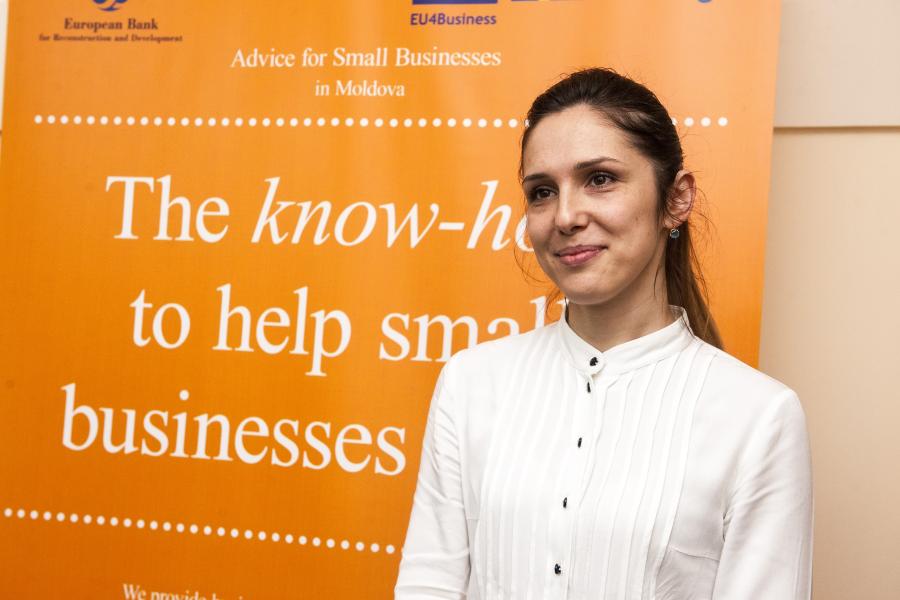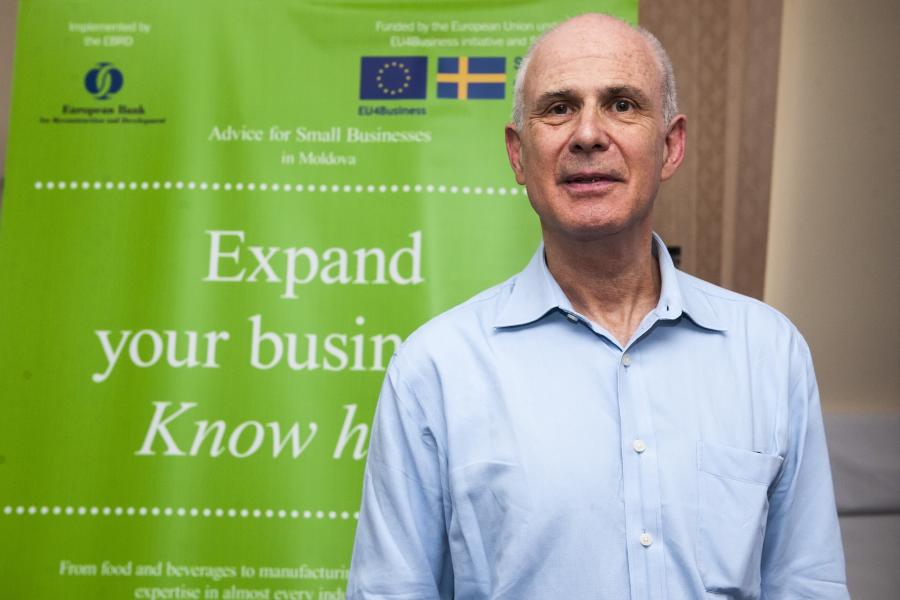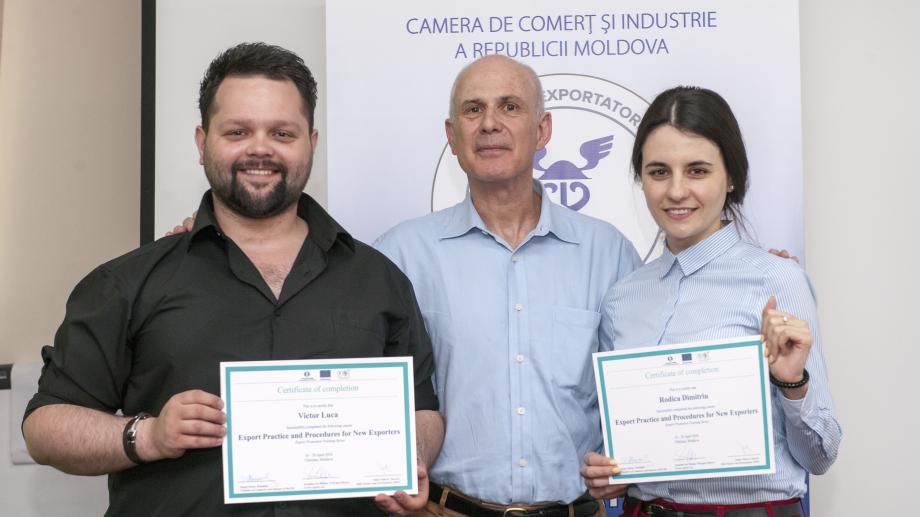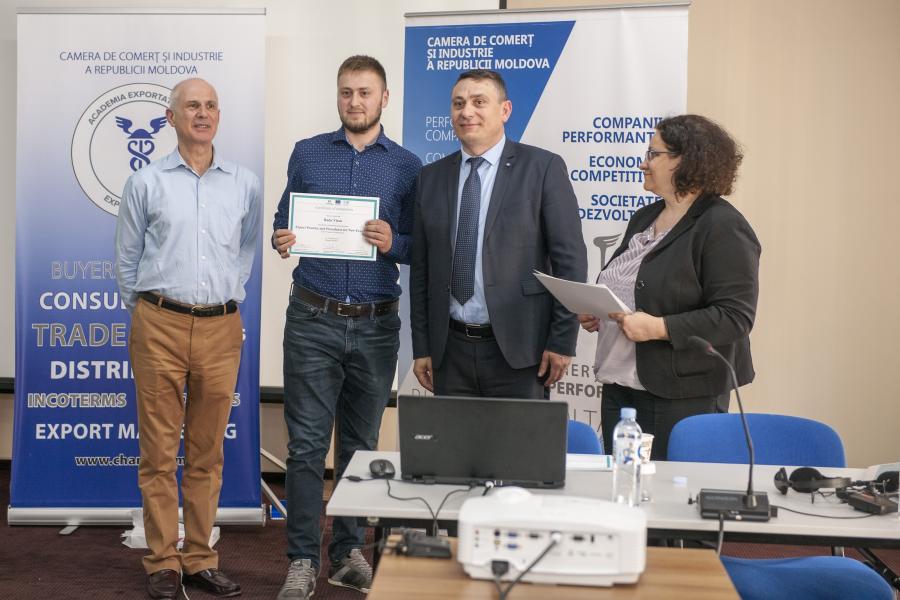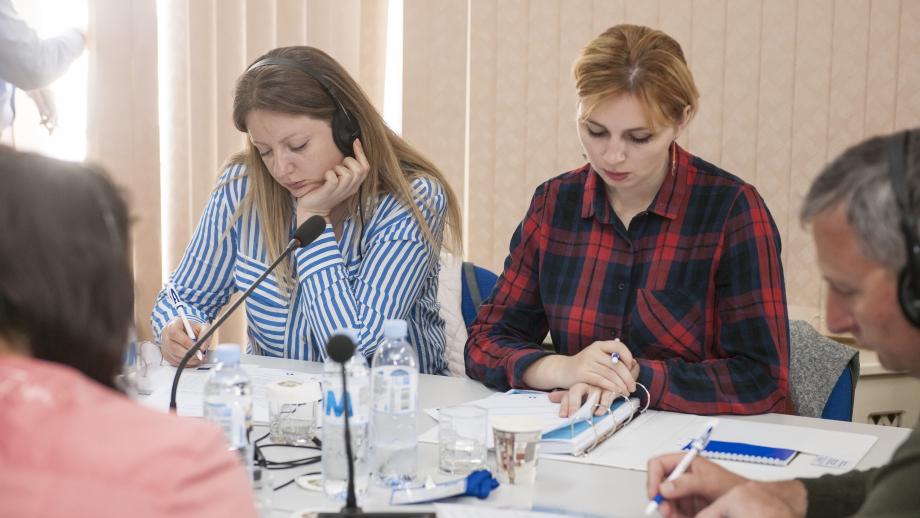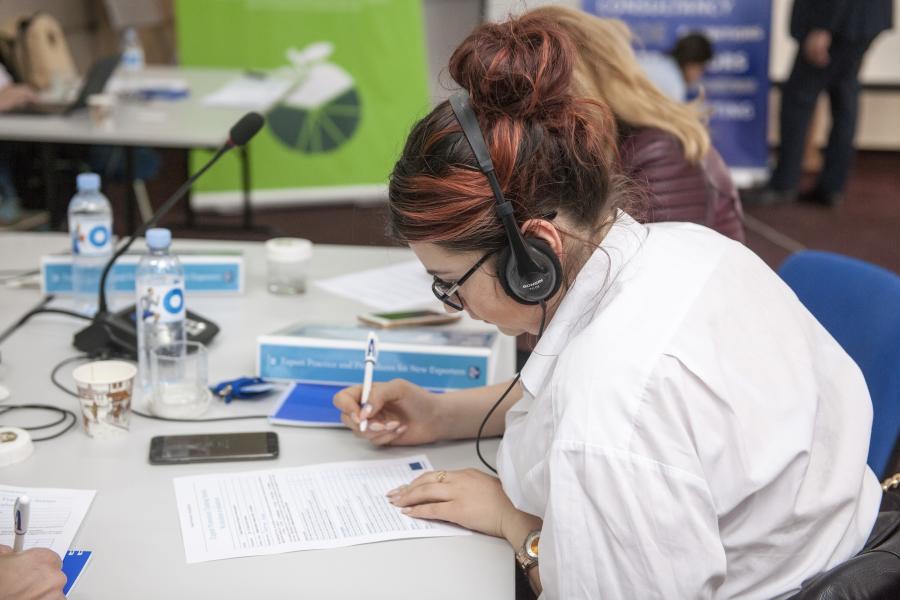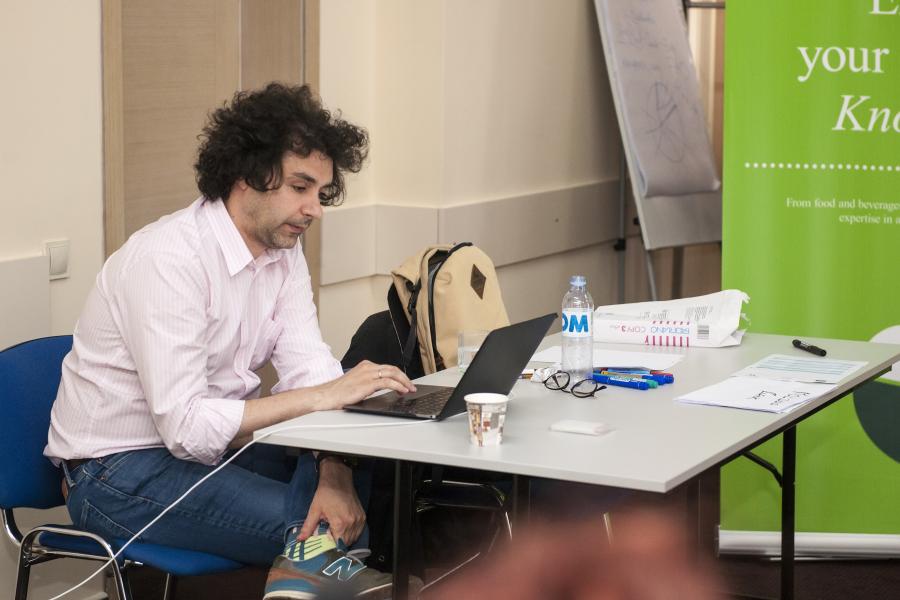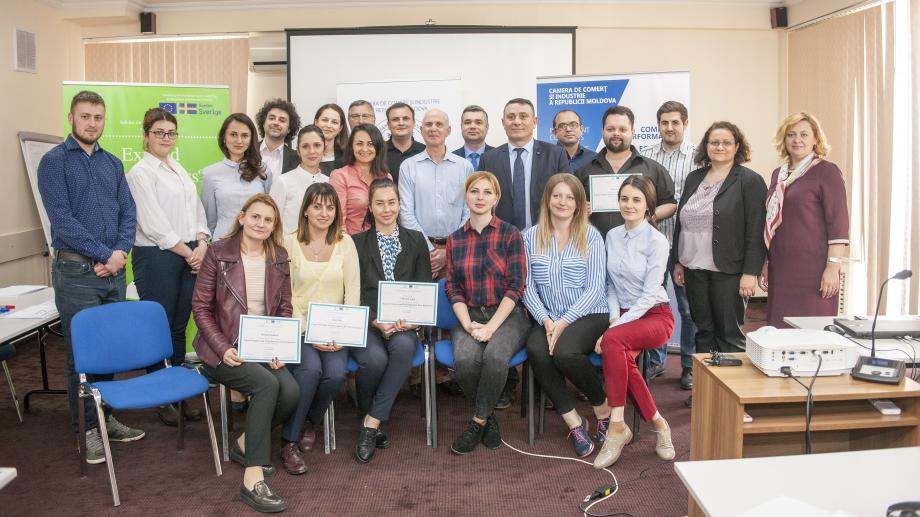The Exporters’ Academy was recently launched in the Republic of Moldova by the Moldovan Chamber of Commerce and Industry (CCI), so that Moldovan entrepreneurs could become familiar with the rules of exporting to the European market. As part of this initiative, the European Bank for Reconstruction and Development in April 2018 organised two trainings in cooperation with the CCI – one for beginner exporters and one for advanced ones. Carried out through the EU4Business initiative, the two training courses stimulated Moldovan entrepreneurs to develop their businesses and increase their competitiveness when accessing the European market.
The year 2014 opened up new opportunities for the entrepreneurial environment in the Republic of Moldova. While exports to the EU got a green light with the conclusion of the Association Agreement and the entry into force of the chapter concerning the Deep and Comprehensive Free Trade Area between the Republic of Moldova and the EU, Moldovan entrepreneurs realised they didn't quite know how to use their new opportunities. That’s because exporting to the European market is completely different from exporting to Russia, which they’ve been used to for years. To close this gap, the CCI launched the Exporters’ Academy, aiming to guide Moldovan entrepreneurs in the process of exporting to the EU and to give them all the tools they need for a successful start on the European market.
The East Invest experience must be multiplied
From 2010, the CCI was part of the EU4Business East Invest regional project to facilitate investment and trade in the Eastern Partnership countries, developed within the EU4Business initiative. The goal of the project was to increase economic actors’ capacities in order to promote and facilitate economic and investment cooperation between the EU and the Eastern Partnership countries. Thus, during 2010-2017, a whole range of small and medium-sized enterprises from Moldova benefited from training sessions, exchanges and study visits in EU countries, thus improving their skills and contributing to intensifying economic relations between the EU and Moldova.
Starting from this positive experience, the CCI set out to continue the practice of disseminating knowledge and promoting trade relations between Moldova and the EU. “We came up with the idea of an Exporters’ Academy following the Academies organised together with Eurochambres as part of East Invest. The rich experience accumulated along the years has enabled us to launch the new Academy to help Moldovan entrepreneurs enter the European market,” says CCI Vice-President Mihai Bîlba.
All different, but with the same goal
The 'Export Practices and Procedures for Small and Medium-Sized Enterprises' training sessions for beginner and advanced exporters, the first trainings organised under the umbrella of the Exporters’ Academy, brought together entrepreneurs managing different businesses, with different ambitions and business development goals, but all interested in the same thing: taking advantage and making the most of the European Union market export opportunities.
Guided by local and international experts, the exporters learned the rules of exporting to the EU market. The training sessions were designed to help and encourage companies to initiate and develop their export activity, in order to be able to access new market outlets. The training sessions for beginner exporters focused on topics related to EU regulations and technical standards, as well procedures for customs clearance, declarations and payment for goods. Advanced exporters learned how to select the markets to increase their exports, how to get relevant information for export market research, how to plan a study visit abroad, how to manage commercial, banking, political and country risks, etc. To better engage the entrepreneurs, the organisers charged a participation fee of EUR 81 for the beginner exporters and EUR 165 for the advanced ones.
Jonathan Ian Walden, lead consultant for UK-based Crown Agents, an international development company and global provider of consultancy services, was one of the experts guiding the Moldovan entrepreneurs in the process of getting to know the export procedures. “I met extraordinary people at the training session, people who want to export to the EU market. I’m pleasantly surprised by their enthusiasm and by their willingness to improve their export skills for an increased presence of Moldovan goods on the European market,” said Jonathan Ian Walden.
Exporting improves business
To Victor Luca, an entrepreneur managing a restaurant business in the town of Soroca, taking part in the training session was a true revelation. He heard about this opportunity by chance – and viewed it as an opportunity. Now he’s going back home not just with more knowledge about the possibility of exporting to the EU market, but also with an actual action plan. “I’m now convinced that Moldova has every possibility of winning over the European consumer. In addition to the financial potential provided by the European market, it’s also a captivating thing, making you learn and improve continuously. So, for me, exporting to the EU is a personal ambition as well,” says Victor Luca.
After managing business in the restaurant and hospitality industry for over 10 years, the entrepreneur now intends to diversify his portfolio, and is increasingly tempted to explore the Republic of Moldova’s exporting potential. He has already managed to test Europeans’ reaction and was surprised to see that Moldovan products such as wine or fruits, for example, are highly appreciated among EU consumers. At the same time, he became aware there is a series of gaps in information which, unless eliminated, mean you simply cannot succeed, no matter how ambitious you may be. His participation in the training session was therefore more than welcome, as he managed to get answers to a series of questions concerning the path entrepreneurs must cover to get their products on the shelves of European shops.
“We live in a rather polluted information environment, where quality information is very scarce. The training fee is a symbolic investment compared to the quality of the suggestions and recommendations received. Such opportunities are, unfortunately, rather limited in Moldova, and increasing their media profile among the youth would change the situation. But, as it is, many ambitious young people launch businesses on a purely intuitive basis, with no information, and then later give up, lose their self-confidence and no longer want to do business, even though we've got an enormous potential among the youth,” says Victor Luca.
The fear has been overcome
Iana Ursu, who manages the Biser.md website specialising in the sale of embroideries and various handicraft accessories, has long been aware of the need to export – a need also dictated by circumstances. She has already received a range of orders from Romania to export handmade products, but didn't know how to fulfil them. At the same time, she decided it would be pointless to start going down this route without having the knowledge to do it. “What I felt was fear, not knowing where to start. Things have become much clearer now,” says Iana Ursu.
She is firmly convinced that participating in the training session is an opportunity to develop her business and explore new export possibilities. “I have learned many things I didn't know, and I’m going back home with the idea that it’s worth exporting to the European Union market,” says the entrepreneur with conviction.
Tatiana Bass, from Dasterum, a company already exporting construction materials to the European market, received additional information about product certification at the training session and learned where she can find certain important information and what rights exporters enjoy on the new markets. “It opened our eyes to many issues we didn't even suspect existed. We are now more confident in what we do. It's worth trying to explore the new possibilities”, says Tatiana Bass, who has understood that “accessing the European market requires continuous improvement of product quality.”
Identifying partners in the EU can save us
The agricultural sector opens up great perspectives for the Republic of Moldova, accounting for approximately 40% of the country’s Gross Domestic Product. For entrepreneurs developing businesses in this sector, the opening of the European market is therefore a genuine lifeline, following trade restrictions on their products on the Russian market, which, until recently, was a traditional outlet for Moldovan farmers.
Diana Vlasiuc is a legal counsellor working for Agarista Agricola, which owns a 250-hectare orchard with plum, apricot, and cherry trees in the village of Cobusca Veche, part of the district of Anenii Noi. She came to the training session to learn about the legal aspects required for accessing the European market, so as to guide the company during the export process.
“To any producer, the EU market is a business development opportunity. We currently only market fresh and dried fruits in Russia, where we can actually only sell through intermediary companies. If we find partners in the EU, we are confident it’s going to be a lot easier for us to achieve our agricultural production. There are years when we've got buyers, but there are also years when we have to look for them,” says Diana Vlasiuc.
Fani SRL, from the village of Măgdăcești, in the district of Criulei, which specialises in producing fruits, is a family business that started out in 1995. For over two decades, its main export markets have been Belarus and the Baltic countries, but for five years now, the company has also been exporting grapes, apples, and plums to the EU. “Every country has its own export practices and it was important to find out what they are in the case of European countries. Moreover, we have also learned from other people’s mistakes,” said company manager Ștefan Bîtlan. Now, Fani SRL's management is ready to implement the experts’ recommendations, in order to increase its presence on the European market. The company also intends to diversify its markets and bring its products to the Middle East as well. “The knowledge we have gained from the training session will enable us to do that,” says Ștefan Bîtlan confidently.
A good trend
The practice of regularly training entrepreneurs is taken from the European level. “Experience has shown that they all need support in order to become integrated into international trade. There are things you simply can’t know before you export. That’s why we are learning together how to be competitive at an international level,” says CCI president Sergiu Harea.
The Exporters’ Academy is a joint effort by the Chamber of Commerce and Industry and the EBRD to help Moldovan entrepreneurs develop their export potential. "By growing your exports, you’ll grow your profit, expand your business scope and become more competitive,” said Veronica Arpintin, national manager of the EBRD's Advice for Small Businesses team for Moldova.
The Academy intends to train around 150 entrepreneurs per year, thus contributing to increasing the Republic of Moldova’s potential of exporting to the European Union market.
Statistical data shows that the proportion of Moldovan exports going to the EU market increased from 53.3% in 2014 to 65.3% in 2017, as a result of the implementation of the Free Trade Agreement with the EU. The total value of goods exported to the EU in 2017 amounted to $1254.6 million. The data from the Ministry of Economy and Infrastructure shows that, while in 2013 the number of companies exporting to the EU was 1,018, in 2016 their number had increased to 1,360, which means that more and more Moldovan entrepreneurs consider the EU market as an opportunity to develop their business.
Author: Mariana Tabuncic
Article in Romanian published in ‘Profit’ magazine

